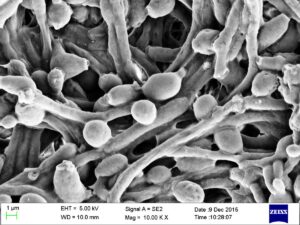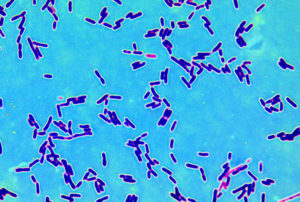
It has long been known that fungi and viruses live in the gut microbiome (the bacteria, fungi, viruses living in the gut), but generally the focus has only been on the bacteria living there. The viruses tend to be bacteriophages - viruses that go after bacteria by infecting them and killing them.
Bacteriophages have a large influence on what lives in the gut, as well as having an effect on the immune system. They start living in the human gut (the GI or gastrointestinal tract) shortly after birth. Scientists are now studying phages to see if they can be used against harmful bacteria and as a treatment for chronic diseases that involve the gastrointestinal system. They think that they could be used in place of antibiotics for antibiotic resistant bacteria.

Fungi are considered immune stimulating. They can have beneficial effects (cause immune responses that promote metabolic health and protect against infection). Others (sometimes even the same species!) can have harmful effects, such as promoting inflammation, for example, in intestinal bowel diseases (IBD). Candida albicans is one such fungi - it is found in the gut of most people, and can cause problems or not.
From Medscape: The Extra-Bacterial Gut Ecosystem: The Influence of Phages and Fungi in the Microbiome
Research on the gut microbiome — and clinical attention to it — has focused mainly on bacteria, but bacteriophages and fungi play critical roles as well, with significant influences on health and disease, experts said at the Gut Microbiota for Health (GMFH) World Summit 2025.
Fungi account for < 1% of the total genetic material in the microbiome but 1%-2% of its total biomass. “Despite their relative rarity, they have an important and outsized influence on gut health” — an impact that results from their unique interface with the immune system, said Kyla Ost, PhD, of the Anschutz Medical Campus, University of Colorado, in Denver, whose research focuses on this interface. ...continue reading "The Viruses and Fungi Living In Our Gut"

 An interesting in-depth book about the air we breathe and all the microbes in it was recently published. There are multitudes of microbes (viruses, bacteria, fungi) hidden in our air. We can't see them, but they are there. The book Air-borne: The Hidden History of the Life We Breathe is by award winning author Carl Zimmer.
An interesting in-depth book about the air we breathe and all the microbes in it was recently published. There are multitudes of microbes (viruses, bacteria, fungi) hidden in our air. We can't see them, but they are there. The book Air-borne: The Hidden History of the Life We Breathe is by award winning author Carl Zimmer. For a while now it has become clear to some scientists that the prevailing view of Alzheimer's disease (buildup in the brain of 2 substances: amyloid and tau) isn't correct. Instead, some researchers feel that there is growing evidence that viruses are implicated as a cause of Alzheimer's and other neurodegenerative diseases (e.g., vascular dementia, ALS, Parkinson's disease, multiple sclerosis).
For a while now it has become clear to some scientists that the prevailing view of Alzheimer's disease (buildup in the brain of 2 substances: amyloid and tau) isn't correct. Instead, some researchers feel that there is growing evidence that viruses are implicated as a cause of Alzheimer's and other neurodegenerative diseases (e.g., vascular dementia, ALS, Parkinson's disease, multiple sclerosis).
 Just read about an international study that discussed how millions of bacteria and viruses circle the earth in the earth's atmosphere every day, and get deposited on land by rain and dust particles. Which could explain why similar viruses and bacteria are found in totally different environments in different parts of the world.
Just read about an international study that discussed how millions of bacteria and viruses circle the earth in the earth's atmosphere every day, and get deposited on land by rain and dust particles. Which could explain why similar viruses and bacteria are found in totally different environments in different parts of the world.  There are many posts on this site about the microbes within us (the microbiome) or around us, but the following article may be a real eye opener. Due to the permafrost melting (as in Alaska, northern Canada, Siberia, etc) from global warming, old infectious viruses and bacteria might be released from the thawing permafrost. This is what recently happened in Siberia, where melting permafrost released anthrax spores which killed 2300 reindeer and a 12 year old boy, and sickened at least 20 other people. From Scientific American:
There are many posts on this site about the microbes within us (the microbiome) or around us, but the following article may be a real eye opener. Due to the permafrost melting (as in Alaska, northern Canada, Siberia, etc) from global warming, old infectious viruses and bacteria might be released from the thawing permafrost. This is what recently happened in Siberia, where melting permafrost released anthrax spores which killed 2300 reindeer and a 12 year old boy, and sickened at least 20 other people. From Scientific American: Bacillus anthracis - Anthrax bacteria
Bacillus anthracis - Anthrax bacteria  Skin anthrax lesion on the neck
Skin anthrax lesion on the neck  Yes, even healthy newborns have a diversity of viruses in the gut - this is their
Yes, even healthy newborns have a diversity of viruses in the gut - this is their  This nice general summary of what scientists know about the microbial community within us was just published by a division of the NIH (National Institutes of Health). Very simple and basic. From the National Institute of General Medical Sciences (NIGMS):
This nice general summary of what scientists know about the microbial community within us was just published by a division of the NIH (National Institutes of Health). Very simple and basic. From the National Institute of General Medical Sciences (NIGMS):